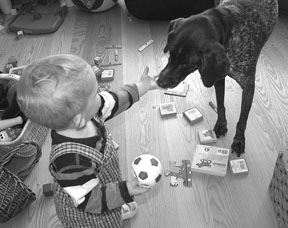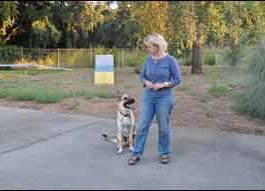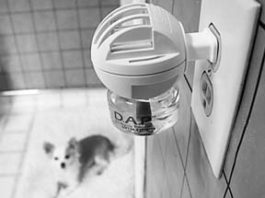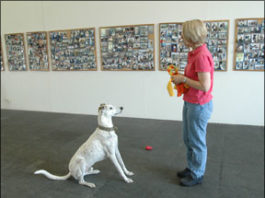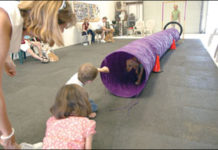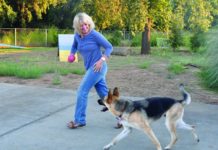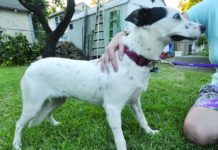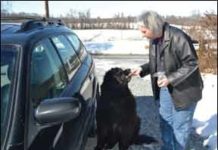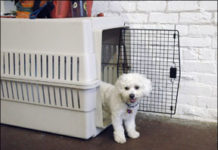Know When Your Dog is Scared
Recently, on the drive home from our annual vacation in Maine, our 11-year-old Brittany, Vinny, suddenly and inexplicably awoke from a sound sleep, and began to tremble, pant, pace, and obsessively lick at the sides of his travel crate. When I crawled back over the seat to find out what was wrong, I observed that Vinny's eyes were squinty
Conditioning Confidence in Your Dog or Puppy
There was once a time when you rarely encountered the word socialization" in dog circles. Today it's the new training buzzword; if you haven't heard it at least three dozen times by the time your dog is a dozen weeks old
Is Your Dog Afraid of Thunder?
Everyone knows a thunderstorm horror story. A terrified dog leaps off a balcony or breaks through a plate glass window before jumping a fence, running into traffic, and meeting an unhappy fate. Or the animal simply disappears and is never seen again. More common and just as distressing are the panic attacks that overcome stay-at-home dogs when thunder roars or the neighbors light firecrackers. Conventional veterinary medicine treats thunderstorm and other noise phobias with powerful tranquilizers or psychoactive drugs, none of which cure the patient and all of which have adverse side effects.
If Your Dog is Afraid of Thunder
but thousands of owners count on them to calm their thunder-phobic dogs."
Noise-Phobic Dogs
As unlikely as it sounds, one of the most effective treatments for thunderstorm phobias may be an over-the-counter hormone used by humans to prevent insomnia. Melatonin, produced by the pineal gland, sets the body’s internal clock in response to exposure to light. The body creates melatonin only in total darkness, for the pineal gland stops production when any part of the body, even the back of the leg, is exposed to light. In people, melatonin has been shown to calm the nerves, reduce anxiety, relieve panic disorders, prevent migraine headaches, facilitate deep sleep, and, according to some researchers, help slow the effects of aging.
Are Dogs More Fearful Than They Used to Be?
An increasing percentage of clients are bringing dogs to me for help with fear-related behaviors. Many of my fellow behavior professionals agree: They, too,...
Behavior-Modifying Drugs for Dogs: Medications for treating fear, phobias, and anxiety in dogs
Separation anxiety, aggression, fear of humans, fear of other dogs - though common, these pet behaviors indicate your dog may be suffering on a neuro-chemical level. How anxiety medications work in humans is still a considerable mystery, but we know that some also work on dogs. Can they help YOUR dog live a less stressed life?
Taking More Steps To a Calm Dog
Every behavior and training professional has seen her share of WCCS dogs. Some have developed their own programs to help humans help their dogs.
A Calming TTouch To Noise-Phobic Dogs
When the average dog hears a loud or unusual noise, as long as no one around him panics or acts strangely, he'll generally figure out that there is nothing to worry about. But noise-phobic dogs don't seem to notice that the earth just keeps turning, noise or no noise. This is where Tellington TTouch can make a difference. While TTouch works to help every animal become better balanced and more consciously responsive to itself and its environment, it is with the fear-based and/or habitual response patterns that TTouch can truly work wonders.
Help For a Dog With Car Phobia
Behavior issues, from simple good manners infractions to the more concerning problems of phobias and aggression, appear in dogs both large and small. But while training to modify behavior issues might look the same regardless of size, in other respects, the bigger the dog, the bigger the problem. When a Dachshund has a lapse in housetraining, the cleanup process is significantly easier than if an Irish Wolfhound has an accident. If a Havanese frantically jumps up on your elderly Aunt Tilly, the collateral damage is less than if a Great Dane does the same. And if a Yorkie is terrified of riding in the car and refuses to get in for an emergency trip to the vet, he can be picked up and placed inside – not so when a Newfoundland steadfastly refuses.
How to Help Your Noise-Phobic Dog Get Through Loud Events
July 4th is still a month away, but in many parts of the country sound-sensitive dogs and the humans who love them are already struggling with the effects of thunderstorms. Our Corgi, Lucy, is a thunder-phobe, and we know all too well the impact thunder and firecrackers have on her (and our) quality of life. Fortunately, the following can make life better for you and your dog during noisy events.
Socializing a Shy Dog
Somewhere at this very moment, perhaps at a shelter near you, a frightened dog huddles in the back of her kennel, trembling, terrified by a chaotic overload of sensory stimuli: sights, smells, and sounds that are far beyond her ability to cope. Somewhere, today, a warmhearted, caring person is going to feel sorry for this dog - or one similar - believing that love will be enough to rehabilitate the frightened canine. Sometimes, it is. More often, though, the compassionate adopter finds herself with a much larger project than she bargained for. While shelters can a prime source for frightened and shy dogs, they are certainly not the only source. Pet stores, puppy mills, rescue groups, and irresponsible breeders (even some who breed top quality show dogs) can all be guilty of foisting off temperamentally unsound (due to genetics/nature) or under-socialized (due to environment/nurture) puppies and adult dogs on unprepared adopters.


